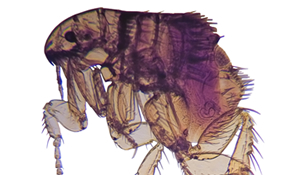Flea control and removal newcastle
Fleas Control Services
Ashman Pest Control Services have been ridding the North East of pests for 10 years. We work across Newcastle, Sunderland and County Durham. Experts in our field, we are specialists in bee & wasp nest removal, rodent control, rats & mice, flea, ant & insect control. We provide a professional, discreet and complete service that will remove all of those unwanted tenants.
Adult fleas are wingless and vary in colour from grey to dark mahogany. Flattened laterally (tall and thin), an important characteristic of the flea is the muscular development of their hind legs that enables them to be able to project vertically at a considerable distance. This means the flea can jump from a pupation site on the ground to the body of a passing blood source.The mouth parts of fleas are well adapted to sucking blood.
Egg - Larvae-Pupa-Adult (incomplete metamorphosis)
Egg length - 0.5 mm long, pearly white
Eggs - laid in clothing, bedding or a host
Eggs hatch in 2-3 days
Pupa - cocoon spun by larvae. The temperature dictates when development will happen.
Emergence from the cocoon is usually in response to vibration.
Adults - 2mm long.
The cat flea is the commonest of the flea species. Fleas are vectors of disease, but there is little evidence to suggest that they transmit any serious illness to humans.
FAQ
1. What are the signs of a flea problem?
You will probably see your pet constantly scratching. Bites on you or family members - flea bites can produce an allergic reaction. Bites can be intensely itchy and symptoms include a small red spot approximately 5mm in diameter. Flea bites can cause skin irritation on sensitive skin.
2. How can I get rid of fleas?
Thorough cleaning and vacuuming with a crack and crevice nozzle will help remove eggs and larvae. This should be followed up with the removal of the waste in to an outside bin to prevent further infestations. Professional treatment with a residual insecticide and veterinary treatment for your pet are further options that should be seriously considered.
3. How did I get fleas?
Fleas can be carried into the home on your pet or a person. Cat and bird fleas are the most common.
4. What do fleas eat?
Larvae feed on debris and adult flea droppings. Adult fleas feed on vertebrae blood.
How Ashman Can Help
Ashman Pest Control Services can respond to your call within 24 hours, in many cases we offer a same day service. Our pest control services cover both domestic and commercial pest, rodent and insect problems.
As we understand that pest problems can be embarrassing, we offer complete discretion. Our vans are all unmarked and our technicians guarantee a discreet service.
For a free estimate/advice call us on: 07808 888 569 or email us.

